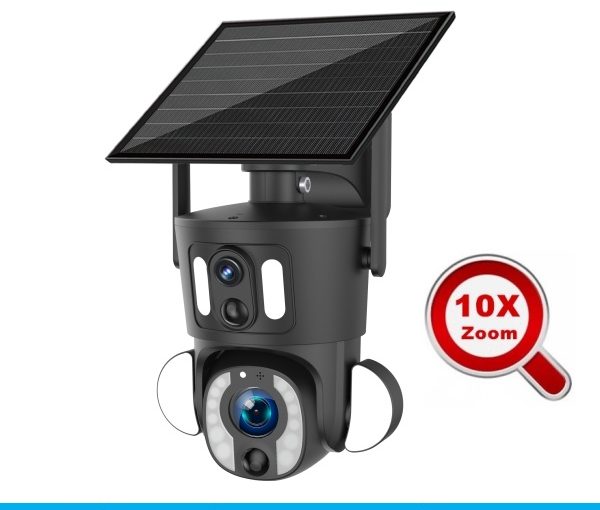Private Label Security: Building Your Solar Camera Brand from Scratch
Entering the security hardware market can seem daunting. The landscape is dominated by established names, and the costs associated with research, development, and manufacturing appear prohibitive for new entrants. Yet, a significant opportunity exists for savvy entrepreneurs, distributors, and security professionals: building your own brand through private labeling. As an engineer who has spent over a decade designing and producing solar security cameras, I’ve seen this model transform businesses.
The global demand for reliable, off-grid surveillance is surging. From remote construction sites to sprawling agricultural farms and critical infrastructure, the need for cameras that operate without traditional power or Wi-Fi has never been greater. This is where the solar security camera niche shines, and private labeling is your most direct path to capturing a piece of this lucrative market. It allows you to leverage a factory’s expertise to launch a product line under your own brand, quickly and cost-effectively.
Why Private Label Solar Security Cameras? The Untapped Opportunity
The appeal of solar-powered security solutions goes beyond simple convenience. It taps into a growing demand for sustainable technology and provides a practical answer for locations where trenching cables is impossible or too expensive. For a business, this translates into a high-value proposition for your customers.
By choosing to private label, you are not just reselling a product; you are building an asset. You control the branding, the market positioning, and most importantly, the profit margins. Instead of competing on price with dozens of other resellers offering the same generic camera, you present a unique, branded solution. This strategy is ideal for 4G operators looking to bundle hardware with data plans, Amazon sellers aiming to create a defensible brand, and security installers wanting to offer exclusive products to their clients.
The Blueprint: Your 5-Step Journey from Concept to Market
Building a brand from scratch is a structured process. With the right manufacturing partner, you can navigate it efficiently. Here is a step-by-step blueprint based on my experience helping hundreds of clients launch their own solar camera brands.
Step 1: Define Your Brand and Niche
Before you even think about hardware, you must answer a critical question: Who is your customer? The needs of a farmer monitoring livestock are vastly different from those of a project manager securing a multi-million dollar construction site. Defining your niche dictates the necessary product features.
- Construction Sites: Require rugged, durable cameras with 4G connectivity, powerful night vision, and PTZ (Pan-Tilt-Zoom) capabilities. A 4G solar camera for construction sites is a perfect starting point.
- Farms & Ranches: Need long-range wireless capabilities, long battery life, and perhaps specialized features like camouflage for wildlife monitoring.
- Residential & Small Business: Focus on ease of installation, user-friendly app interfaces, and aesthetic design, such as a sleek floodlight security camera.
Your brand identity—your logo, name, and messaging—should resonate with this target audience.
Step 2: Find the Right Manufacturing Partner
Your choice of partner is the single most important decision you will make. A weak partner leads to product failures, supply chain disruptions, and a damaged brand reputation. A strong partner acts as an extension of your team. Use this checklist when vetting potential manufacturers:
- Proven Engineering Expertise: Do they have a dedicated R&D team? Can they discuss technical details like Battery Management Systems (BMS) and image sensor performance with authority? A partner’s deep understanding of BMS technology is crucial for product longevity.
- Customization Capability: How flexible are they? Can they accommodate requests beyond a simple logo swap?
- Robust Quality Control (QC): Ask about their QC process. This should include component testing, assembly line checks, and finished product aging tests.
- Certifications and Compliance: Ensure they have the necessary certifications (CE, FCC, RoHS, etc.) for your target markets.
- Transparent Communication: A good partner provides regular updates and is responsive to your inquiries.
Step 3: The Customization Deep Dive

This is where your brand comes to life. Private labeling with a capable factory like UBOXCAM goes far beyond sticking a logo on a box. True customization allows you to create a product that feels uniquely yours.
Here’s what you can typically customize:
- Hardware Branding: Silkscreening your logo directly onto the camera housing.
- Packaging & Manuals: Designing custom retail boxes and user manuals with your branding and instructions.
- Software & App: Customizing the mobile app’s startup screen, logo, and even color scheme to provide a seamless brand experience for the end-user.
- Hardware Specifications: For larger volume orders (ODM), you can even specify hardware components like battery capacity, solar panel wattage, or the type of image sensor used to achieve specific performance goals, such as superior night vision.
Step 4: Navigating Production & Quality Assurance
Once you approve the final “golden sample,” mass production begins. A trustworthy manufacturer will maintain the same quality standards from the first unit to the last. The QA process should be non-negotiable and typically involves multiple stages: Incoming Quality Control (IQC) for raw materials, In-Process Quality Control (IPQC) on the assembly line, and Outgoing Quality Assurance (OQA) before shipment. This rigorous process prevents costly returns and protects your brand’s reputation.
Step 5: Go-to-Market Strategy
With your product ready, it’s time to execute your launch plan. Your strategy will depend on the niche you chose in Step 1. Whether you are selling through a network of dealers, listing on Amazon, or supplying directly to large projects, your branded product gives you the flexibility to define your own path to market without being dictated by a master brand’s policies.
OEM vs. ODM vs. Private Label: Choosing Your Path
These terms are often used interchangeably, but they represent distinct business models. Understanding the difference is key to aligning your strategy with your resources. Here is a clear breakdown:
| Feature | OEM (Original Equipment Manufacturer) | ODM (Original Design Manufacturer) | Private Label (White Label) |
|---|---|---|---|
| Concept | You provide the complete design and specifications. The factory builds it for you. | You select a factory’s existing design and request modifications to make it unique. | You select a factory’s market-ready product and apply your own brand and packaging. |
| Investment | Very High (R&D, tooling molds) | Medium (Potential tooling fees for modifications) | Low (Primarily branding and inventory costs) |
| Time-to-Market | Long (12-24 months) | Medium (6-12 months) | Fast (1-3 months) |
| Customization Level | Total control over every component. | High level of customization on an existing base model. | Minimal customization, focused on branding and packaging. |
| Best For | Large, established brands with in-house R&D teams. | Brands wanting a unique product without the cost of ground-up R&D. | Startups, Amazon sellers, distributors wanting a fast and low-risk market entry. |
Case Study: Launching a 4G Solar Camera Brand for Construction Sites
- Problem: A national security installation company was losing bids on temporary construction sites. Their clients needed reliable surveillance but were deterred by the high cost and complexity of running power and internet lines. Reselling existing brands offered thin profit margins and no brand loyalty.
- Solution: The company partnered with UBOXCAM to launch their own private label brand. They selected a robust 4G Solar PTZ Camera as their flagship product. We silkscreened their logo on the cameras, designed custom packaging, and tailored the app’s welcome screen. We also provided technical data sheets and marketing materials under their new brand.
- Result: Within three months, they launched “SiteSecure” cameras. Because they were selling a unique, branded solution, they commanded a 40% higher profit margin compared to their previous reselling model. They won contracts for over 50 construction sites in the first year, and customers began specifically asking for the “SiteSecure” solution, establishing strong brand equity.
Avoiding Common Pitfalls: An Engineer’s Troubleshooting Guide
Building a brand is rewarding, but it has potential challenges. Here are common issues and how to proactively solve them by choosing the right partner.
- Pitfall 1: High Product Failure Rate. This is almost always due to poor component sourcing and lack of rigorous testing. A quality-focused manufacturer stress-tests every critical component, especially the battery and its BMS, to ensure performance in harsh outdoor conditions.
- Pitfall 2: Battery Life Doesn’t Match Specs. This is a classic engineering problem of system imbalance. An inexperienced factory might pair a power-hungry camera with an inadequate solar panel or battery. A true engineering partner calculates the entire system’s power budget to ensure the solar panel can genuinely sustain the battery and camera operation, even on cloudy days. You need to understand the difference between a low-power camera and a standard one.
- Pitfall 3: Lack of After-Sales Support. What happens when a security vulnerability is found or a new feature is needed? Your brand’s reputation is on the line. Ensure your manufacturing partner has a plan for ongoing firmware updates (FOTA – Firmware-Over-the-Air) to support the product long after it’s sold.
Your Next Step: Building a Lasting Brand

The path from concept to a successful solar camera brand is clearer and more accessible than ever. Private labeling removes the most significant barriers—R&D overhead and manufacturing complexity—and allows you to focus on what you do best: building your brand and connecting with customers.
By partnering with an experienced and reliable manufacturer, you gain more than just a product; you gain access to years of engineering knowledge, a streamlined supply chain, and a foundation for long-term growth. The key is to choose a partner who understands the technology inside and out and is invested in your success.
Ready to take the first step in building your own security brand? Contact the UBOXCAM engineering team today. We can help you define your product, navigate customization options, and create a high-quality solar security camera line that your customers will trust.

